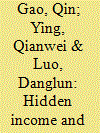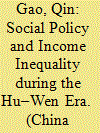|
|
|
Sort Order |
|
|
|
Items / Page
|
|
|
|
|
|
|
| Srl | Item |
| 1 |
ID:
139266


|
|
|
|
|
| Summary/Abstract |
Using a unique dataset based on a survey conducted by the Guangzhou Land Resources and Housing Administrative Bureau from November 2009 to January 2010, this article examines the sources and distribution of the hidden income of residents from different occupational backgrounds, taking into consideration their explicit income and other socio-economic characteristics. The results show that government officials not only had the highest but also the most stable hidden income, followed by employees in state-owned enterprises and employees in colleges or research institutions. Among government officials, those holding higher-level positions possessed more hidden income than those in lower-level positions. These findings have implications for China's labour market, taxation and resource allocation, and need to be taken into consideration in future economic and political policy designs and implementations.
|
|
|
|
|
|
|
|
|
|
|
|
|
|
|
|
| 2 |
ID:
116537


|
|
|
|
|
| Publication |
2012.
|
| Summary/Abstract |
Using the China Household Income Project migrant survey data from 2007 to 2008, this paper examines the association between migrant workers' labor contract status and their social insurance participation, including pensions, work injury insurance, unemployment insurance, medical insurance, and the housing provident fund. The results show that having a labor contract, especially a long-term contract, improved the migrant workers' social insurance coverage to a substantial extent. Furthermore, moving from having a short-term contract or no contract to having a long-term contract significantly increased one's odds of having social insurance, whereas losing a long-term contract reduced the likelihood of having social insurance. These results highlight the importance of having a long-term labor contract for migrant workers' ability to obtain social insurance coverage and thereby increase their security and protect their basic rights.
|
|
|
|
|
|
|
|
|
|
|
|
|
|
|
|
| 3 |
ID:
095304


|
|
|
|
|
| Summary/Abstract |
Using nationally representative household survey data and a revealing statistical method, this article investigates the redistributive nature of the Chinese social benefit system within urban and rural areas respectively and in the national context. Like many other dimensions of Chinese society, the redistributive nature of social benefits appeared to be a two-sided story: urban social benefits were much more generous and predominantly progressive, while rural social benefits were minimal and consistently regressive. The national social benefit system was redistributed regressively, but the extent of its regressivity decreased over time, suggesting an equity-oriented policy direction echoed by several recent government initiatives to support rural residents, migrants and the urban poor. The outcomes of these initiatives, especially their redistributive effects, require close observation and await evaluation.
Qin Gao is an assistant professor at Fordham University in New York City. Her current research focuses on the Chinese social benefit system in transition and its impact on poverty, income inequality, and family economic and subjective well-being and cross-national comparative social policy analysis among China, South Korea and Vietnam.
|
|
|
|
|
|
|
|
|
|
|
|
|
|
|
|
| 4 |
ID:
068575


|
|
|
| 5 |
ID:
164413


|
|
|
|
|
| Summary/Abstract |
The Hu–Wen era saw significant expansions in social policies in China. How did these policy changes affect income inequality, and did they leave a progressive legacy? Using the China Household income Project (CHIP) 2002, 2007 and 2013 data, this article offers empirical evidence to answer these questions. We find that these social policy changes indeed led to some convergence of the divided urban–rural–migrant social welfare systems and helped curtail the growing income inequality driven by market forces. Measured as the share in household final income, the size of urban social benefits decreased, while those for rural residents and rural-to-urban migrants increased from 2002 to 2013. Social benefits – especially pensions – reduced income inequality in all three groups, although to a much smaller extent for rural residents and migrants as compared to their urban peers. Rural residents also gained from agricultural and livelihood subsidies through the “Building a new socialist countryside” initiative.
|
|
|
|
|
|
|
|
|
|
|
|
|
|
|
|
|
|
|
|
|